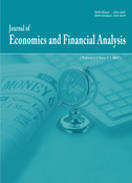Articles
|
Femi Akinlade
|
1-15
|
|
Boris YASHNIKOV
|
17-32
|
|
Shen ZHANG
|
33-48
|

THE EDITORS CHOICE
|
Femi Akinlade
|
1-15
|
||
|
This paper empirically investigates inflation dynamics in Sub-Saharan African economies within a New Keynesian Phillips Curve framework over the period 1995–2024. While the Phillips Curve has been extensively examined in advanced economies, evidence from Sub-Saharan Africa remains fragmented and inconclusive. Using a panel of Sub-Saharan African countries and a hybrid New Keynesian Phillips Curve estimated via Generalized Method of Moments, the study evaluates the relative importance of forward-looking expectations, inflation persistence, and real economic slack. The findings indicate that inflation in the region is characterized by strong persistence and a limited forward-looking component, with marginal costs providing a more robust measure of inflationary pressure than output gaps. The Phillips relationship weakens substantially during periods of macroeconomic instability, supporting the view that the inflation–activity trade-off in Sub-Saharan Africa is conditional on the economic environment. The results highlight the importance of structural and institutional factors in shaping inflation dynamics and suggest that standard New Keynesian models require regional adaptation when applied to low- and middle-income economies.
|
|||
|
Boris YASHNIKOV
|
17-32
|
||
|
This paper examines how digitalization reshapes inflation dynamics by conditioning the slope and persistence of the Phillips Curve within a New Keynesian framework. Using U.S. quarterly data from 1990Q1 to 2024Q4, the study estimates backward-looking, forward-looking, and hybrid New Keynesian Phillips Curves via Generalized Method of Moments, embedding digital intensity as a structural modifier of the inflation–slack transmission mechanism. The results show that U.S. inflation dynamics are best characterized by a hybrid Phillips Curve in which forward-looking expectations dominate but inflation persistence remains non-negligible. While the inflation response to real activity is modest when slack is measured by the output gap, it becomes substantially stronger when proxied by real marginal costs. Crucially, digitalization significantly weakens the pass-through from both output gaps and marginal costs to inflation, flattening the Phillips slope as digital intensity rises, while leaving the forward-looking component largely intact. These findings suggest that digitalization does not eliminate the Phillips Curve but transforms its transmission channel, offering a structural explanation for the coexistence of subdued inflation responsiveness and expectation-driven pricing in the digital era.
|
|||
|
Shen ZHANG
|
33-48
|
||
|
This paper examines whether cryptocurrency market volatility operates as an auxiliary cost-push pressure within the New Keynesian Phillips Curve framework. Using quarterly data for the United States from 2010Q1 to 2025Q1, we estimate closed- and open-economy hybrid NKPC specifications augmented with an aggregate measure of crypto volatility constructed from the Garman–Klass estimator applied to the top 100 cryptocurrencies by market capitalization. Crypto volatility is interpreted as capturing digital-financial uncertainty, energy-cost pressures, and expectation-related effects that are not fully reflected in standard macroeconomic variables. Generalized Method of Moments estimations indicate that crypto volatility enters inflation dynamics with a consistently positive coefficient in forward-looking and hybrid specifications, while remaining insignificant in purely backward-looking models. Controlling for crypto volatility slightly attenuates the estimated Phillips curve slope, suggesting that digital financial instability conditions observed inflation–slack relationships rather than replacing them. Overall, the findings point to cryptocurrency markets as a complementary transmission channel linking financial volatility and inflation dynamics in the post-2010 U.S. economy.
|
|||
